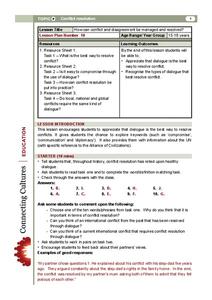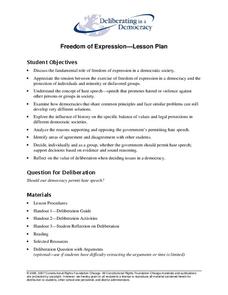Learning to Live
Attributes of a Civil Society
What makes a society civil? High school freshmen search for examples of justice, kindness, peace, and tolerance in news media and brainstorm how they can promote these attributes in their schools, communities, and world. The well-rounded...
Curated OER
Home Living/ Daily Living: Food Pyramid
What did you have for lunch? Did it contain all four food groups? Help your special education class make good food choices and recognize foods in each of the four food groups. They look at images and discuss the foods on the food pyramid...
Tennessee State Museum
An Emancipation Proclamation Map Lesson
Did the Emancipation Proclamation free all slaves during the Civil War? Why was it written, and what were its immediate and long-term effects? After reading primary source materials, constructing political maps representing information...
Overcoming Obstacles
Clarifying Values
Encourage thoughtful decision making with a instructional activity that highlights the importance of values. Scholars take part in a grand conversation, listen to stories, and make decisions based on their personal values.
Roy Rosenzweig Center for History and New Media
Rosa Parks and the Montgomery Bus Boycott
Participants examine two documents related to Rosa Parks and the bus boycott, sources that challenge some of the commonly held preconceptions about Rosa Parks. They then respond to discussion questions to reinforce understanding and...
Channel Islands Film
Arlington Springs Man: Lesson Plan 3
Imagine being part of a team of scientists that discover the oldest human remains in North America. Imagine being part of the crew that documents this discovery. Class members get a change to be part of such an exciting adventure in a...
The New York Times
Revolt! Comparing Historical Revolutions
What elements are needed to have a revolution? How do historical revolutions from across the globe and generations compare with one another? This is an excellent activity that incorporates group work, source analysis, and an engaging...
Channel Islands Film
Once Upon a Time (Saxipak’a): Lesson Plan 4
How did the environment and natural resources found on the Channel islands influence the culture of the Chumash? Archaeology meets technology in an activity designed for middle schoolers. After viewing West of The West's documentary Once...
Stanford University
Chronology: Civil Rights in the 20th Century
Test pupils' knowlege of history and the way civil rights movements unfolded using a series of images. With a primary source analysis activity, scholars practice their chronology and deductive reasoning skills. They use their knowledge...
National Endowment for the Humanities
Chief Executives Compared: The Federalist Papers
Delve into the responsibilities of the president by looking at President Hamilton's opinion of the presidential office in his own words. The second in a three-part series, the resource also offers an interesting compare-and-contrast...
Curated OER
Lesson 4: The Judiciary: A Brief Introduction to the Courts System
Focusing on the judicial branch of government, the fourth lesson in this series explores the structure of the US courts system. Beginning with an engaging activity based on the short story The Lady or the Tiger, students go on to examine...
Curated Video
Copyright
Introduce your class to the concept of copyright with a series of activities. Pupils first learn about copyright laws and fair use, putting their knowledge to the test with a quick categorizing task. They then watch a video and answer...
Civil War Trust
The Common Civil War Soldier
Imagine you are a soldier in the Civil War. What are you wearing? What do you need to carry with you? Examine the life of a person during the Civil War, from drummer boys to powder monkeys to musket-toting soldiers. Elementary learners...
Museum of Tolerance
Developing Media Literacy
To protect young people from questionable content, many schools limit access. This resource suggests that because learners can so readily avail themselves to unrestricted Internet access, it is vital for 21st century learners to develop...
Carolina K-12
The Results are In! Examining Our First Vote Election
The 2016 election is over, and now it's time to dig in to some data! An activity revolves around data gathered from the First Vote Project in North Carolina wherein thousands of students voted. After diving in to the data using provided...
Channel Islands Film
Island Rotation: Lesson Plan 1
How do scientists provide evidence to support the theories they put forth? What clues do they put together to create these theories? After watching West of the West's documentary Island Rotation class members engage in a series of...
Carolina K-12
EU Movement Role Play
Using role play, a graphic organizer, and discussion, your class members will compare and contrast the movement of people and goods between countries in the European Union before and after the organization was established. This is a...
University of the Desert
How Can Conflict and Disagreement be Managed and Resolved?
As you explore the meaning of cultural understanding and diffusion with your learners, discuss how dialogue can play a role in resolving conflicts based on misunderstanding. Examine keywords such as compromise, communication, and...
University of the Desert
How Do I Feel That My Culture Is Misunderstood by Others?
Using video clips of young adults from around the world describing their cultures and how they can be misunderstood, learners compare their own cultural point of view to that of others through discussion and writing.
Miami-Dade County Public Schools
Honoring All Who Served Veterans Day
November 11th, Veterans Day, is a holiday set aside to honor all those who have served in the military. Here's a resource packed with ideas, activities, projects, and materials that will provide inspiration for ways to celebrate those...
Bully Free Systems
Bully Free Lesson Plans—11th Grade
It takes courage to stand up to bullies. Two sample lessons from a complete Bully Free curriculum, "Courageous and Brave Bystanders" and "Assertiveness Skills for Bullied Students and Empowered Bystanders" provide participants with...
John F. Kennedy Presidential Library & Museum
Ask Not What Your Country Can Do for You
Ask not what the lesson here can do for you, but what you can do with the lesson. The answer is quite a lot! Young scholars revisit JFK's famous inaugural address with a focus on his plea for civic engagement. There's a letter to JFK...
Deliberating in a Democracy
Freedom of Expression
Should democracies include hate speech as a protected right? Scholars analyze the rights found under the First Amendment to the Constitution through researching evidence. Freedom of expression becomes the focal point of the...
Curated OER
A Picture is Worth a Thousand Words
Pupils create various types of graphs. They go to suggested websites to collect data and create graphs to organize the data. Then they answer questions according to their graph.

























